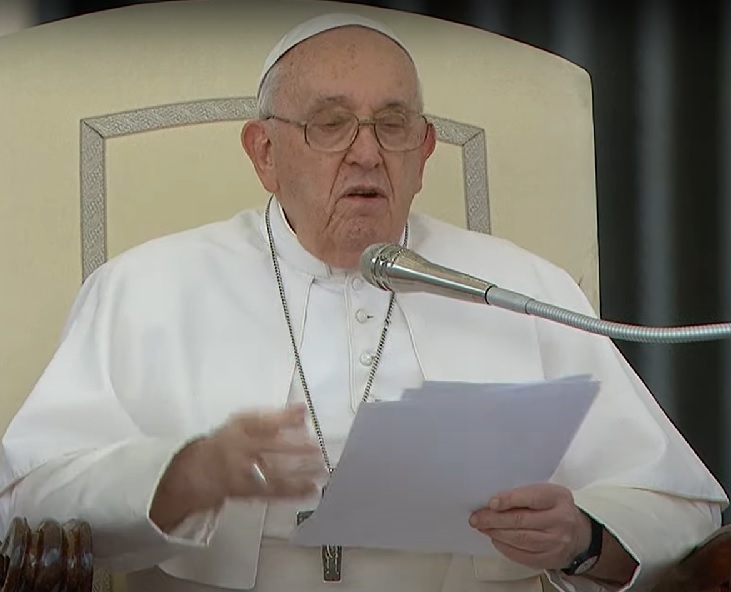Pope: God is free and liberating.Renewed invitation to pray for peace on October 27
At the general audience a reflection on Saints Cyril and Methodius, the apostles of the Slavs, as a great example of the inculturation of the faith as a path to mission. New appeal for the release of hostages and the entry of humanitarian aid into Gaza: "I continue to pray for those who suffer and to hope for paths of peace". The Holy See's representative at the UN Mgr. Caccia: "Although the path of dialogue today seems narrow, it is the only possible option to end the violence".
Vatican City (AsiaNews) - Our thoughts are fixed on the war in Gaza and Israel, like all the other conflicts that are bloodied in the world. But also the reflection on the liberating force of the Gospel, capable of transforming peoples and cultures from within. These are the two elements that marked the general audience held by Pope Francis in St. Peter's Square today.
Continuing the cycle of catechesis on zeal in evangelization, the pontiff retraced the history of Saints Cyril and Methodius, "the apostles of the Slavs".
“Born in Greece in the 9th century to an aristocratic family – he recalled – they renounced a political career to dedicate themselves to monastic life. But their dream of a retired existence is short-lived. They were sent as missionaries to Great Moravia, which at the time included various peoples, already partly evangelized, but among whom many pagan customs and traditions survived."
Cyril and Methodius studied the culture of those peoples in depth and understood that for a true encounter with the Gospel it was necessary to give their language an alphabet, which would allow them to translate the Bible and liturgical texts. It was a great example of inculturation of the faith: “Think – Francis underlined – two Greek monks giving an alphabet to the Slavs. It is this openness of heart that has rooted the Gospel among them."
There was no shortage of conflict from some Latins, who saw their monopoly on preaching among the Slavs taken away. “Their objection is religious – commented the pontiff -, but only apparently: God can be praised – they say – only in the three languages written on the cross, Hebrew, Greek and Latin. But Cyril responds forcefully: God wants every people to praise him in their own language. Together with his brother Methodius he appeals to the Pope and he approves their liturgical texts in the Slavic language, has them placed on the altar of the church of Santa Maria Maggiore and sings with them the praises of the Lord according to those books".
Looking at the testimony of these two evangelizers, whom Saint John Paul II wanted as co-patrons of Europe, Francis invited us to reflect on "three important aspects". “First of all, unity: the Greeks, the Pope, the Slavs.
At that time there was a non-divided Christianity in Europe, which collaborated to evangelise". Then “inculturation: evangelization and culture are closely connected”. But a last aspect is also freedom. “I like to note – Francis further observed – how the Pope in those circumstances was on the side of evangelical freedom, supporting those courageous missionaries.
The Petrine ministry shows itself here at the service of a Gospel that does not accept being armored, but which opens up to the future of God: which valorises what the Spirit has already sown and does not identify itself with the forms of the past. God is free and liberating."
“Brothers and sisters – concluded the Pope – we ask Saints Cyril and Methodius, apostles of the Slavs, to be instruments of 'freedom in charity' for others”.
Then greeting the groups of pilgrims present, the Pope returned to talking about the war: “I always think of the serious situation in Palestine and Israel. I encourage the release of the hostages and the entry of humanitarian aid into Gaza – he said -. I continue to pray for those who suffer and to hope for paths of peace in the Middle East, in the tormented Ukraine and in other regions wounded by war". In this regard, he recalled the appointment of the day of fasting, prayer and penance announced for Friday 27 October, during which at 6 pm he himself will preside over a celebration in St. Peter's Basilica "to implore peace in the world".
Meanwhile yesterday the permanent representative of the Holy See to the UN, Msgr. Gabriele Caccia, made the pope's appeals for peace in the Middle East resound even at the UN headquarters in New York.
In a statement during the debate on the situation in Gaza and southern Israel, he cited the three points around which Francis' interventions in recent days revolve: the condemnation of the terrorist attack perpetrated by Hamas, with the request for the release of all hostages; the reminder in the exercise of the right of defense of the need for individual guilt not to be placed on the shoulders of an entire population; concern for the humanitarian disaster caused by the war in Gaza.
“Amid the escalation of violence – concluded Msgr. Caccia - it is imperative that the authorities of the State of Israel and the State of Palestine demonstrate the audacity to renew their commitment to a peace based on justice and respect for the legitimate aspirations of both sides. Although the path of dialogue appears narrow today, it is the only possible option to put a lasting end to the spiral of violence that has engulfed that land, so dear to Christians, Jews and Muslims. The Holy See - he concluded - remains convinced that the two-state solution still offers hope for this peace".







.png)










